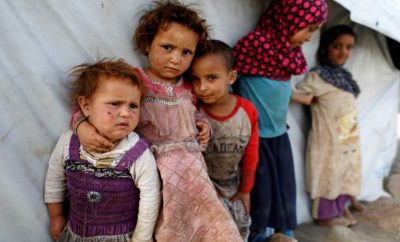There’s No Legal Moral for What the US Doing in Yemen
The House of Representatives has even passed a resolution that tacitly says America shouldn’t assist Saudi Arabia in its fight against Yemen. That’s because the House believes the US is only authorized to fight terrorist groups like ISIL or Al-Qaeda whether they are in the Middle East, North Africa, or even Asia.
The key distinction here is that the lawmakers say the US isn’t authorized to fight the resistance movement of Ansarullah, a party mainly formed of the Houthis.
Whatever this is, it’s time for Washington to end its criminal involvement in Yemen war, but, crucially, the United Nations should also step in to have a say in all this, because the House resolution is nonbinding; it is only a small step forward, and the shift in US foreign policy is not going to happen overnight.
That means the US will likely continue to assist Saudi Arabia by refuelling its planes and providing intelligence in Riyadh’s brutal air war against the defenceless population of Yemen. The US will also continue to sell weapons to Riyadh worth billions and accuse Iran of supporting the Houthi Ansarullah movement in order to hide its complicity in Saudi war crimes and defuse international criticism:
A- As maintained by many US officials and Pentagon commanders, the US-backed Saudi-led war on Yemen is unwinnable – despite the attempts by the young Saudi prince who is the country’s next king to escalate the war even further.
Three years into this unnecessary bloodshed should be more than enough for the War Party to reach conclusion that what it has on its hands is yet another endless war that like the one in Afghanistan is unwinnable.
B- Yemen has suffered greatly due to the US-Saudi blockade and airstrikes that have destroyed hospitals, schools, and other civilian infrastructure. With more than 900,000 suffering from cholera, roughly 20 million Yemenis need humanitarian assistance to meet basic needs – including food and water – out of a pre-war population of 28 million. This clearly makes Washington complicit in Saudi war crimes and crimes against humanity.
C- Crown Prince Mohammed bin Salman is the mastermind behind the war. It’s part of his aggressive anti-Iran policy in the Middle East, which led him to invade Yemen in support of the former president Manour Hadi – who resigned weeks after his two-year term had ended – against the Ansarullah popular movement. But the truth is somewhere in the middle. The Houthis didn’t emerge due to Iranian support, even if they got ideological and political support later on their rise to power.
Rather, they originated as a theological movement in the early 1990s. More importantly, and despite the White House claims at the UN Security Council earlier this week that Houthis are Iran’s hands, it is important to realize that Iran’s role in Yemen is basically constructive, as everywhere in the region. Simply put, Iran says there is no military solution to this particular conflict. Iran has always support political solutions to the regional problems as it wants stability in the region that it lives in to ensure improving economy, investment and exports.
D- US support for the growing humanitarian crisis likely isn’t going away. The US has said that the best way to end the crisis is through “aggressive diplomacy”. If that’s the case, then the US, with or without the Congress resolution, must immediately stop its military support to the Saudi war, lift the illegal blockade and allow commercial imports at the demand of dozens of aid groups such as Doctors Without Borders, Oxfam and UN agencies, stop attacking the Ansarullah movement forces, and push the Saudis to move into a political process as quickly as they can – but without any preconditions.
E- Indeed, there is still room for the Americans in a political settlement. The international civil society welcomes that, but not when the Americans provide mid-air refuelling for Saudi and UAE warplanes that are conducting air attacks against civilians, plus assistance with bomb targeting on a regular basis, and also not when the Americans are helping the Saudis in their illegal blockade, which is something that goes on very consistently in broad violation of International Humanitarian Law and the UN Charter.
Under the prevailing environment, the United Nations Security Council must hold Saudi Arabia and the United States responsible for their repeated and blatant violations of International Law and International Humanitarian Law in Yemen. The world body should call for a non-military solution to the war that involves everyone, including Tehran, Moscow, Riyadh, Washington, and Ansarullah. There is no other way to advance long-term stability in Yemen and end the suffering of its unfortunate people.
In short, Yemen is the latest US foreign policy disaster. For all the wrong reasons, the United States has been instrumental in enabling Saudi Arabia’s ruthless war of choice against the poorest country in the Arab world. According to a recent United Nations report, the Saudi-led coalition has “conducted airstrikes targeting civilians and civilian objects, including refugee camps, hospitals, weddings, and mosques.” Saudi bombing has reduced large tracts of several cities to rubble. Some of the attacks, according to the UN panel, “could amount to crimes against humanity.”
Throughout, the US has quietly but dutifully lent the Saudis weapons, logistics assistance, and diplomatic cover at the UN Security Council. It is time to stop this unjust war of choice, as Washington’s anti-Iran shenanigans and resolutions at the Security Council will go nowhere. Beyond Iran bashing, there simply is no moral, legal, or strategic justification for what the US is doing in Yemen. It has only compromised both US interests and its moral standing – if there’s any left.
Source:Agencies

